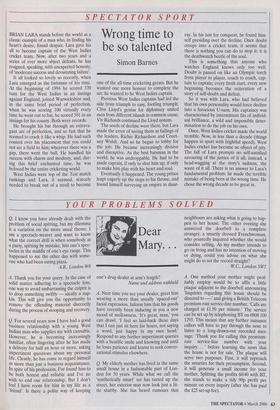SPECTATOR SPORT
Wrong time to be so talented
Simon Barnes
BRIAN LARA stands before the world as a classic example of a man who, in finding his heart's desire, found despair. Lara gave his all to become captain of the West Indies cricket team. Now, after two years and a series of ever more abject defeats, he has resigned, speaking, with unexpected honesty, of 'moderate success and devastating failure'.
It all looked so lovely so recently, when Lara emerged as the batsman of his time. At the beginning of 1994 he scored 370 runs for the West Indies in an innings against England, joined Warwickshire and, in the same brief period of perfection, when he was scoring 100 virtually every time he went out to bat, he scored 501 in an innings for his county. Both were records.
He brought his bat through an extrava- gant arc of perfection, and so fast that he seemed to crack it like a whip. He had such control over his placement that you could not set a field to him; wherever there was a gap, there went the ball. He handled his success with charm and modesty, and, dur- ing this brief enchanted time, he was beloved by the entire cricketing world. West Indies were top of the Test match rankings and Lara, it seemed, scarcely needed to break out of a stroll to become one of the all-time cricketing greats. But he wanted one more honour to complete the set: he wanted to be West Indies captain.
Previous West Indies captains had led the side from triumph to easy, footling triumph; Clive Lloyd's genius for diplomacy united men from different islands in common cause; Viv Richards continued the Lloyd system.
The seeds of decline were there, but Lara made the error of seeing them as failings of the leaders, Richie Richardson and Court- ney Walsh. And so he began to lobby for the job. He became increasingly divisive and disruptive. As the best batsman in the world, he was undroppable. He had to be made captain, if only to shut him up, if only to make him play with his heart and soul.
Eventually it happened. The young prince leapt eagerly up the steps to his throne, and found himself surveying an empire in disar- ray. In his lust for conquest, he found him- self presiding over the decline. Once doubt creeps into a cricket team, it seems that there is nothing you can do to stop it: it is the deathwatch beetle of the soul.
This is something that anyone who watches England knows only too well. Doubt is passed on like an Olympic torch from player to player, coach to coach, cap- tain to captain; every fresh start, every new beginning becomes the reiteration of a story of self-doubt and defeat.
So it was with Lara, who had believed that his own personality would force decline into a ferocious U-turn. His captaincy was characterised by intermittent fits of individ- ual brilliance, a wild and impossible deter- mination to do the job on his own.
Once, West Indies cricket made the world tremble. Now, in less than a decade (things happen in sport with frightful speed), West Indies cricket has become an object of pity. The fall of Lara prompts no self-satisfied savouring of the justice of it all; instead, a head-wagging at the story's sadness, the waste of it all. There is no answer to Lara's fundamental problem: he made the terrible mistake of being born at the wrong time. He chose the wrong decade to be great in.


































































 Previous page
Previous page